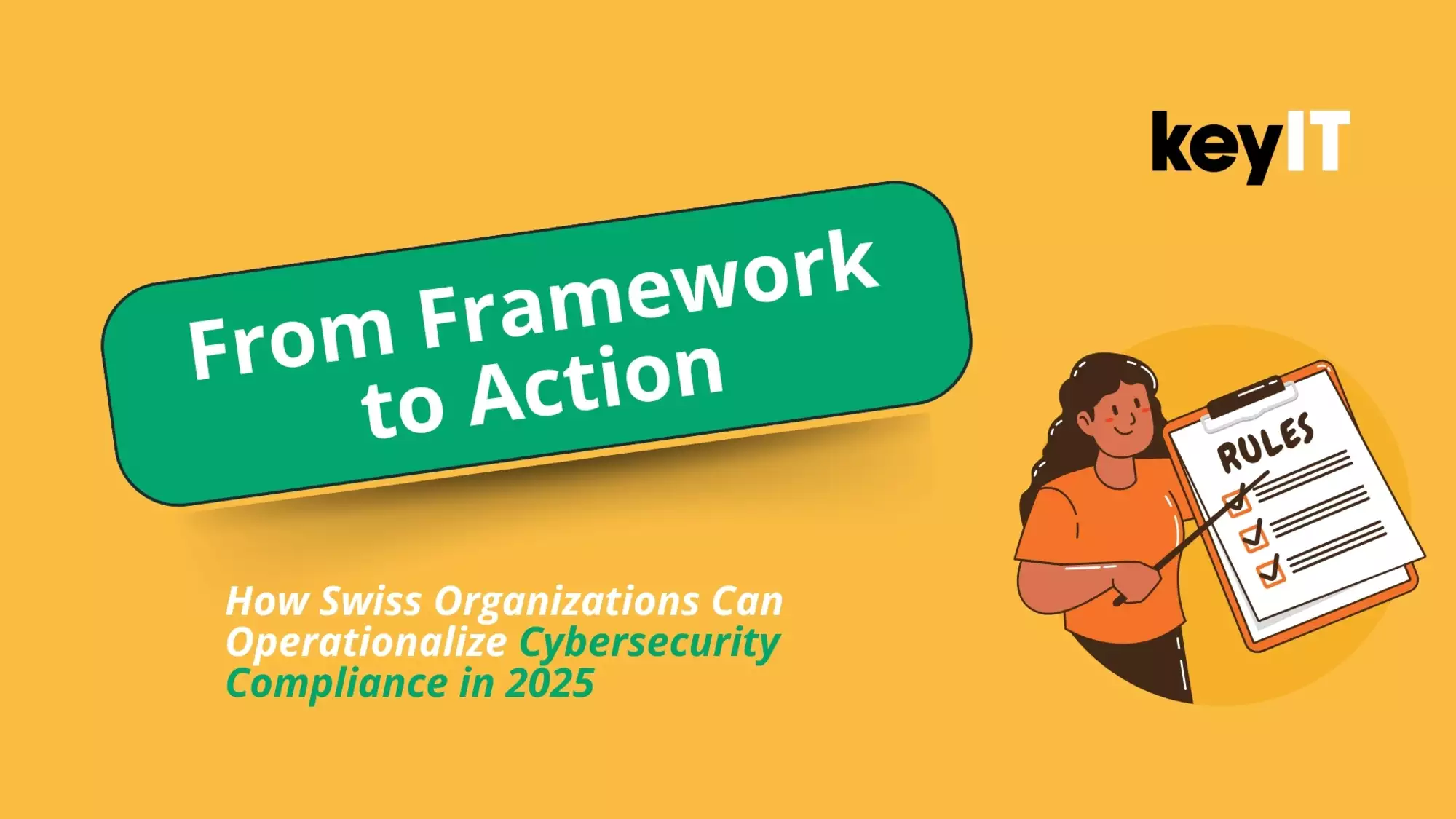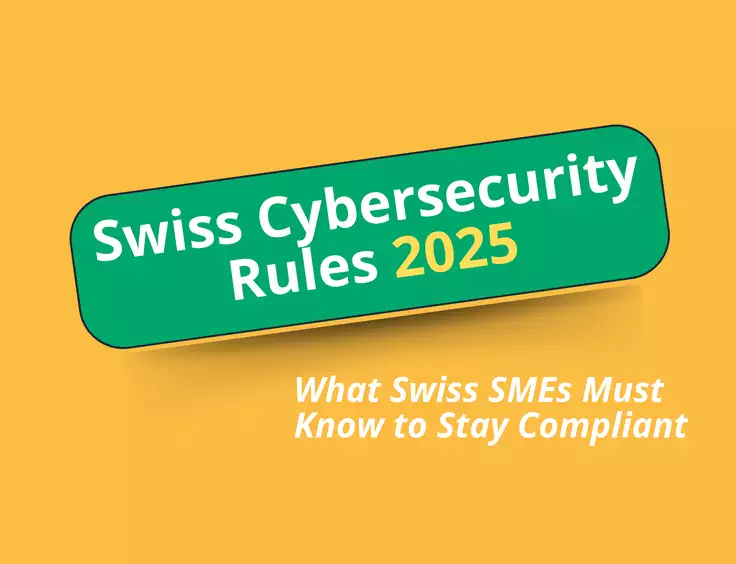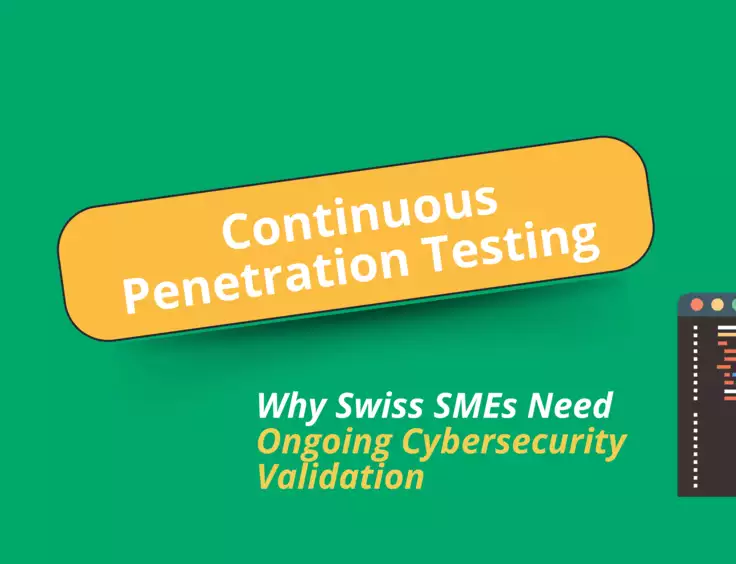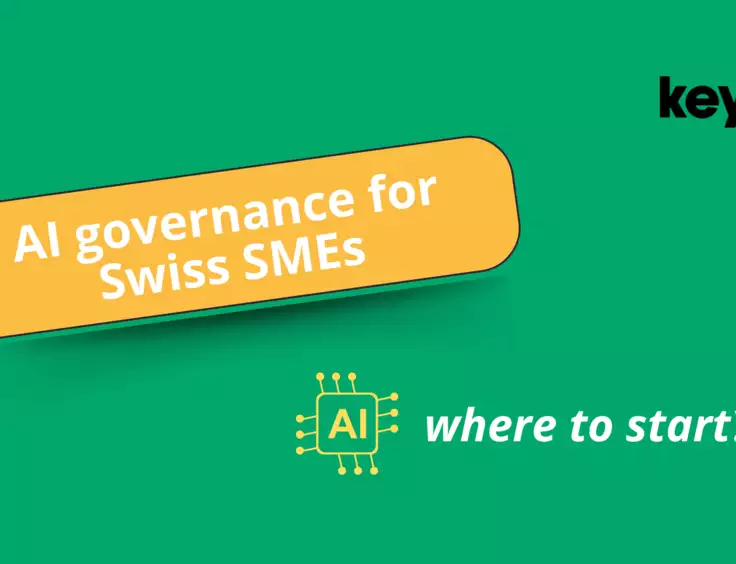From Framework to Action: How Swiss Organizations Can Operationalize Cybersecurity Compliance in 2025

Earlier this year, we outlined what Swiss SMEs should know about the evolving regulatory landscape in our guide to SME compliance. But as new laws take effect, organizations of all sizes are now asking a different question: how do we actually implement this?
With sector-specific requirements and operational expectations rising, the emphasis is shifting from awareness to execution. This article explores what different industries need to do to comply with Swiss cybersecurity regulations in 2025, and how businesses are adapting.
Federal Act on Data Protection (nFADP)
Effective since: September 1, 2023
Applies to: All entities processing personal data in Switzerland
Switzerland's nFADP brings the country in closer alignment with the EU's GDPR. It introduces stronger data governance rules, particularly around risk management and individual rights.
Switzerland's nFADP brings the country in closer alignment with the EU's GDPR. It introduces stronger data governance rules, particularly around risk management and individual rights.
Core Requirements:
- DPIAs for high-risk processing activities
- Mandatory breach notifications to the FDPIC
- Privacy by Design and Default principles
- Documentation obligations, including processing activity records
- Penalties of up to CHF 250,000
In practice: Organizations now need internal processes to assess data risks, handle incidents, and document how personal data is used. Healthcare providers, for example, face additional scrutiny when processing sensitive data like biometrics.
For companies without internal compliance teams, outsourcing data protection responsibilities has become common. Services such as external DPO support help manage breach protocols and regulatory interactions efficiently.
FINMA Circular 2023/1: Operational Risk and Resilience
Effective since: January 1, 2024
Applies to: Banks, insurers, and asset managers
This directive expands cybersecurity responsibilities at the executive level. Risk tolerance must now be actively defined by boards, with formal oversight of cyber resilience planning.
This directive expands cybersecurity responsibilities at the executive level. Risk tolerance must now be actively defined by boards, with formal oversight of cyber resilience planning.
Key Obligations:
- Regular penetration testing and red teaming
- Business continuity and crisis management
- Comprehensive IT and data inventories
- Governance and oversight from senior leadership
In practice: Compliance requires continuous validation of defenses, not just annual audits. Many institutions are turning to autonomous testing tools that simulate attacks and provide measurable insights over time.
ISA and Cybersecurity Ordinance (CSO)
Effective from: April 1, 2025
Applies to: Critical infrastructure operators (utilities, transport, public sector)
This new framework mandates incident reporting and coordination with national authorities.
This new framework mandates incident reporting and coordination with national authorities.
Core Requirements:
- Report cyberattacks within 24 hours to the NCSC
- Submit a full analysis within 14 days
- Clarify applicability with NCSC if uncertain
- Fines of up to CHF 100,000 for non-compliance
- Sanctions become enforceable as of October 1, 2025
In practice: Real-time detection and response capabilities are essential. Operators often use managed monitoring services to meet availability and reporting expectations.
Electricity Supply Ordinance (OApEl)
Effective from: July 1, 2024
Applies to: Swiss electricity providers
OApEl enforces cybersecurity self-assessments and monitoring aligned with the Federal ICT Minimum Standard and the NIST Cybersecurity Framework.
OApEl enforces cybersecurity self-assessments and monitoring aligned with the Federal ICT Minimum Standard and the NIST Cybersecurity Framework.
Requirements:
- Self-assessment every 24 months
- Compliance monitoring by ElCom
- Possible enforcement actions for deficiencies
Electricity providers are integrating these assessments into existing operational audits and often consult external partners for technical reviews and compliance tracking.
EU NIS2: Indirect Compliance for Swiss Manufacturers
Effective from: October 2024
Relevant for: Swiss companies supplying or operating in the EU
Though not EU members, many Swiss manufacturers are within the scope of NIS2 through supply chain obligations.
Though not EU members, many Swiss manufacturers are within the scope of NIS2 through supply chain obligations.
Requirements:
- Incident reporting within 24 hours
- Vendor and supply chain risk management
- Comprehensive cybersecurity policies
Manufacturers with EU partners are conducting audits and revisiting supplier contracts to meet these standards. Cross-border collaboration often requires tailored cybersecurity support.
Rail Sector: CySec Rail Directive
Applies to: Swiss rail operators
This directive introduces baseline cybersecurity rules for the transport sector.
This directive introduces baseline cybersecurity rules for the transport sector.
Key Areas:
- Cyber risk assessments
- Incident response planning
- Collaboration with national cybersecurity authorities
Operators are embedding these requirements into existing safety and risk frameworks. Operationalizing compliance means ensuring staff, systems, and documentation align with legal expectations.
A shift toward operational readiness
The 2025 regulatory landscape makes it clear: cybersecurity compliance isn’t about single policies or once-a-year audits. It’s an ongoing operational function requiring technical controls, documentation, testing, and reporting.
Many Swiss businesses are adopting support structures that allow them to manage this burden without scaling up internal teams. This includes external DPOs for data protection governance, automated testing platforms for regulatory assurance, and managed IT services that cover system monitoring, incident handling, and compliance reporting.
These approaches help organizations meet their obligations with confidence and focus their internal efforts where they matter most.
Want to assess how prepared your organization is for 2025 compliance?
Talk to keyIT about how we support operational cybersecurity from regulatory testing to real-time monitoring and data protection strategy.









